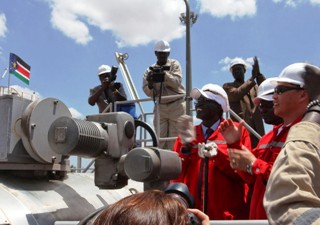Khartoum denies blocking South Sudan oil flow
May 21, 2013 (KHARTOUM) – The Sudanese oil minister Awad Al-Jaz on Tuesday denied reports that his government hampered the exportation of South Sudan crude through the Heglig pipeline, stressing it functions normally.

“South Sudan’s oil is flowing normally on Sudanese soil to the export ports,” the Sudanese minister said.
The oil minister added that the work between Sudan and South Sudan is continuing according to the matrix of the joint cooperation signed by the two countries.
Mutrif Sadiq, the Sudanese ambassador to South Sudan said Tuesday that his government did not authorize closure of the oil flow and was making necessary efforts to find out what actually happened in the field.
The diplomat, who was summoned by the foreign affairs ministry, also distanced his government of any involvement in the oil matter.
A South Sudanese official, speaking on condition of anonymity, told Sudan Tribune on Monday that Khartoum had shut down the pipeline transporting oil produced from Unity state’s Tharjath oil fields through Heglig.
An official from the South Sudanese petroleum and mining ministry went to say that Sudanese security agents shut down the pipeline and chased the workers.
The foreign affairs ministry on Monday summoned the Chinese ambassador over the alleged blockage of the oil flow by the Sudanese government.
Mawien Makol Arik, the spokesperson for the ministry confirmed this, but said the summons had nothing to do oil blockage, but a “sudden” decline in South Sudan oil production.
“The foreign affairs ministry did summon the Chinese ambassador to explain why there was a sudden decline in oil output, yet no explanations had been given,” Arik told Sudan Tribune Tuesday.
He said the country’s oil production, in recent days, fell to just 105,000 barrels per day, from the 200,000 previously produced daily.
“We suspected there was something wrong and that’s why we asked the Chinese envoy to meet us over the matter. Discussions are still in progress,” ministry spokesperson said.
Chinese companies dominate the South Sudanese oil industry having been welcomed into Sudan before the South seceded from the north in 2011 taking with 75% of the country’s 350,000 barrels per day of oil production.
South Sudanese oil production was halted in January 2012 due to a dispute between Khartoum and Juba over transit fees but, as part of a cooperation deal, production resumed last month.
President Salva Kiir is scheduled to join his Sudanese counterpart Omar al-Bashir in to witness the first Southern crude to be exported from Port Sudan on the Red Sea for almost a year and a half.
(ST)
